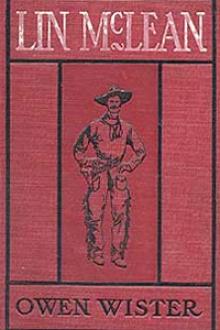The Virginian: A Horseman of the Plains, Owen Wister [best e books to read txt] 📗

- Author: Owen Wister
Book online «The Virginian: A Horseman of the Plains, Owen Wister [best e books to read txt] 📗». Author Owen Wister
She glanced at him with a sort of fierceness, then reached for his pistol, in which was nothing but blackened empty cartridges. She threw these out and drew six from his belt, loaded the weapon, and snapped shut its hinge.
“Please take it,” he said, more anxious and more himself. “I ain't worth tryin' to keep. Look at me!”
“Are you giving up?” she inquired, trying to put scorn in her tone. Then she seated herself.
“Where is the sense in both of us—”
“You had better save your strength,” she interrupted.
He tried to sit up.
“Lie down!” she ordered.
He sank obediently, and began to smile.
When she saw that, she smiled too, and unexpectedly took his hand. “Listen, friend,” said she. “Nobody shall get you, and nobody shall get me. Now take some more brandy.”
“It must be noon,” said the cow-puncher, when she had drawn her hand away from him. “I remember it was dark when—when—when I can remember. I reckon they were scared to follow me in so close to settlers. Else they would have been here.”
“You must rest,” she observed.
She broke the soft ends of some evergreen, and putting them beneath his head, went to the horses, loosened the cinches, took off the bridles, led them to drink, and picketed them to feed. Further still, to leave nothing undone which she could herself manage, she took the horses' saddles off to refold the blankets when the time should come, and meanwhile brought them for him. But he put them away from him. He was sitting up against a rock, stronger evidently, and asking for cold water. His head was fire-hot, and the paleness beneath his swarthy skin had changed to a deepening flush.
“Only five miles!” she said to him, bathing his head.
“Yes. I must hold it steady,” he answered, waving his hand at the cliff.
She told him to try and keep it steady until they got home.
“Yes,” he repeated. “Only five miles. But it's fightin' to turn around.” Half aware that he was becoming light-headed, he looked from the rock to her and from her to the rock with dilating eyes.
“We can hold it together,” she said. “You must get on your horse.” She took his handkerchief from round his neck, knotting it with her own, and to make more bandage she ran to the roll of clothes behind his saddle and tore in halves a clean shirt. A handkerchief fell from it, which she seized also, and opening, saw her own initials by the hem. Then she remembered: she saw again their first meeting, the swollen river, the overset stage, the unknown horseman who carried her to the bank on his saddle and went away unthanked—her whole first adventure on that first day of her coming to this new country—and now she knew how her long-forgotten handkerchief had gone that day. She refolded it gently and put it back in his bundle, for there was enough bandage without it. She said not a word to him, and he placed a wrong meaning upon the look which she gave him as she returned to bind his shoulder.
“It don't hurt so much,” he assured her (though extreme pain was clearing his head for the moment, and he had been able to hold the cliff from turning). “Yu' must not squander your pity.”
“Do not squander your strength,” said she.
“Oh, I could put up a pretty good fight now!” But he tottered in showing her how strong he was, and she told him that, after all, he was a child still.
“Yes,” he slowly said, looking after her as she went to bring his horse, “the same child that wanted to touch the moon, I guess.” And during the slow climb down into the saddle from a rock to which she helped him he said, “You have got to be the man all through this mess.”
She saw his teeth clinched and his drooping muscles compelled by will; and as he rode and she walked to lend him support, leading her horse by a backward-stretched left hand, she counted off the distance to him continually—the increasing gain, the lessening road, the landmarks nearing and dropping behind; here was the tree with the wasp-nest gone; now the burned cabin was passed; now the cottonwoods at the ford were in sight. He was silent, and held to the saddle-horn, leaning more and more against his two hands clasped over it; and just after they had made the crossing he fell, without a sound slipping to the grass, and his descent broken by her. But it started the blood a little, and she dared not leave him to seek help. She gave him the last of the flask and all the water he craved.
Revived, he managed to smile. “Yu' see, I ain't worth keeping.”
“It's only a mile,” said she. So she found a log, a fallen trunk, and he crawled to that, and from there crawled to his saddle, and she marched on with him, talking, bidding him note the steps accomplished. For the next half-mile they went thus, the silent man clinched on the horse, and by his side the girl walking and cheering him forward, when suddenly he began to speak:— “I will say good-by to you now, ma'am.”
She did not understand, at first, the significance of this.
“He is getting away,” pursued the Virginian. “I must ask you to excuse me, ma'am.”
It was a long while since her lord had addressed her as “ma'am.” As she looked at him in growing apprehension, he turned Monte and would have ridden away, but she caught the bridle.
“You must take me home,” said she, with ready inspiration. “I am afraid of the Indians.”
“Why, you—why, they've all gone. There he goes. Ma'am—that hawss—”
“No,” said she, holding firmly his rein and quickening her step. “A gentleman does not invite a lady to go out riding and leave her.”
His eyes lost their purpose. “I'll cert'nly take you home. That sorrel has gone in there by the wallow, and Judge Henry will understand.” With his eyes watching imaginary objects, he rode and rambled and it was now the girl who was silent, except to keep his mind from its half-fixed idea of the sorrel. As he grew more fluent she hastened still more, listening to head off that notion of return, skilfully inventing questions to engage him, so that when she brought him to her gate she held him in a manner subjected, answering faithfully the shrewd unrealities which she devised, whatever makeshifts she could summon to her mind; and next she had got him inside her dwelling and set him down docile, but now completely wandering; and then—no help was at hand, even here. She had made sure of aid from next door, and there she hastened, to find the Taylor's cabin locked and silent; and this meant that parents and children were gone to drive;





Comments (0)